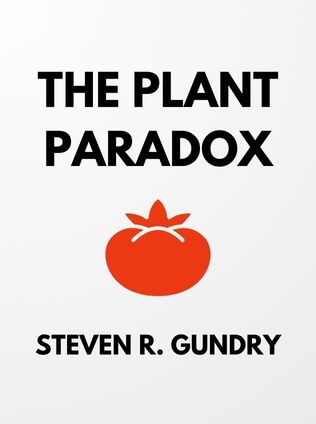
The Plant Paradox
The Hidden Dangers in "Healthy" Foods That Cause Disease and Weight Gain
By Steven R. Gundry
Published 04/2017
About the Author
Dr. Steven Gundry is a highly respected cardiologist, surgeon, and medical researcher who has dedicated his career to understanding and solving some of the most pressing health issues of our time. As the founder of the International Heart and Lung Institute and the Center for Restorative Medicine, Dr. Gundry has a track record of pioneering innovative treatments, particularly in the realm of heart disease. However, his most significant contribution to the field of medicine might be his work on the connection between diet and chronic illness. With a deep focus on how specific foods impact our health, Dr. Gundry’s research has led to a radical reevaluation of what we eat and how it affects our bodies. His book, The Plant Paradox, is the culmination of years of clinical experience and scientific investigation, offering a new perspective on the relationship between plants, diet, and health.
Main Idea
The Plant Paradox centers on a transformative idea: that certain plant proteins known as lectins, found in many of the foods we traditionally consider healthy, can actually be toxic to our bodies. Dr. Gundry argues that these lectins are a significant cause of weight gain, inflammation, and chronic diseases, ranging from autoimmune disorders to cancer. The book challenges the conventional wisdom that encourages the consumption of fruits, vegetables, and whole grains without restriction. Instead, Dr. Gundry advocates for a more selective approach to eating, one that involves carefully choosing which plants to include in our diets and which to avoid.
Table of Contents
- Introduction to the Plant Paradox
- The Hidden Dangers of Lectins
- The Plant Paradox Program (PPP)
- Phase 1: The Three-Day Cleanse
- Phase 2: Six-Week Gut Repair
- Phase 3: Making the PPP Your Lifestyle
- The Ketogenic Plant Paradox Program
- Recipes and Meal Plans
- Success Stories and Testimonials
Introduction to the Plant Paradox
The central thesis of The Plant Paradox is that the very foods we are often told to eat for good health may, in fact, be contributing to our most significant health issues. Dr. Gundry introduces the concept that lectins, a type of protein found in many plants, act as a defense mechanism for these plants but can be harmful when ingested by humans. Lectins are present in the seeds, skins, and leaves of plants, as well as in the meat, milk, and eggs of animals that are fed grains and soy. These proteins are designed to protect plants from predators by making them less digestible or even toxic. However, when humans consume lectins, they can cause a range of health problems, particularly when consumed in large amounts over time.
“It turns out that the smallest things can cause the biggest problems; lectins, a type of plant protein, are toxins that wreak havoc on your internal health, causing weight gain, inflammation, and other physical issues.” — Steven Gundry
Dr. Gundry’s work challenges the conventional view that simply eating more plants is inherently good for our health. He argues that while many plants offer significant nutritional benefits, others contain lectins that can damage our bodies, leading to chronic inflammation, autoimmune diseases, and weight gain. This perspective is particularly important in light of the modern diet, which often includes a high proportion of lectin-containing foods, such as grains, beans, and certain vegetables. Dr. Gundry emphasizes that our ancestors did not consume these foods in large quantities, and our bodies have not evolved to handle the high lectin load that is common today.
The introduction also sets the stage for the rest of the book, where Dr. Gundry delves into the science behind lectins, how they affect our health, and what we can do to protect ourselves from their harmful effects. The idea that foods commonly thought of as healthy could be contributing to disease is a provocative one, and Dr. Gundry presents a compelling case backed by both scientific research and clinical experience.
The Hidden Dangers of Lectins
Lectins are proteins that bind to carbohydrates and are found in a wide variety of foods, including grains, beans, legumes, and some fruits and vegetables. Dr. Gundry describes these proteins as part of a plant’s natural defense system, designed to protect the plant from predators by making it difficult to digest. However, when humans consume lectins, they can have several harmful effects on the body.
“Lectins contribute to health problems including weight gain, inflammation, joint pain, diabetes, and autoimmune diseases.” — Steven Gundry
One of the primary ways lectins cause harm is by disrupting the integrity of the gut lining. Lectins can bind to the gut wall, creating gaps in the intestinal barrier, a condition often referred to as "leaky gut." This allows harmful substances to enter the bloodstream, triggering an immune response that can lead to inflammation and a host of other health issues.
Sign up for FREE and get access to 1,400+ books summaries.
You May Also Like
The Subtle Art of Not Giving a F*ck
A Counterintuitive Approach to Living a Good Life
By Mark MansonRich Dad Poor Dad
What the Rich Teach Their Kids About Money - That the Poor and Middle Class Do Not!
By Robert T. KiyosakiHow To Win Friends and Influence People
The All-Time Classic Manual Of People Skills
By Dale Carnegie



















